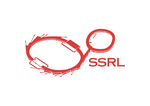Keywords: data management or ssrl or KFN, neutron, research with...
-

ErUM-Data-Hub
The ErUM Data Hub is funded by the German Federal Ministry of Education and Research (BMBF) and...
2 upcoming events (21 past events)ErUM-Data-Hub https://erumdatahub.de https://pan-training.eu/content_providers/erum-data-hub The ErUM Data Hub is funded by the German Federal Ministry of Education and Research (BMBF) and involves stakeholders from all ErUM thematic areas. It takes up ideas from the scientific community and supports and coordinates their implementation. A further aim is to provide support in the transfer of developed solutions to new fields of application and to attract partners beyond ErUM, for example in the areas of energy, climate, sustainability and health. The activities of the ErUM-Data-Hub are divided into 4 work areas: * Networking * Exchange * Digital competencies * Communication /system/content_providers/images/000/000/066/original/Logo-Horizontal-7-300x150.png?1680706364 -

Stanford Synchrotron Radiation Lightsource
The Stanford Synchrotron Radiation Lightsource (SSRL), a Directorate of the SLAC National...
2 training materialsStanford Synchrotron Radiation Lightsource https://www-ssrl.slac.stanford.edu/ https://pan-training.eu/content_providers/stanford-synchrotron-radiation-lightsource The Stanford Synchrotron Radiation Lightsource (SSRL), a Directorate of the SLAC National Accelerator Laboratory (SLAC), is an Office of Science User Facility operated for the U.S. Department of Energy (DOE) by Stanford University. Located in Menlo Park, California, SLAC is a multi-program national laboratory exploring frontier questions in photon science, astrophysics, biochemistry, material science, particle physics and accelerator research. SLAC engages in fundamental research which is published or shared broadly with the scientific community. The DOE Office of Science is the single largest supporter of basic research in the physical sciences in the United States, and is working to address some of the most pressing challenges of our time. The SSRL SPEAR3 3-GeV, high-brightness third-generation storage ring, upgraded in 2004, operates at 500 mA in top-off mode, with high reliability and low emittance. SSRL's extremely bright x-rays are a resource for researchers to study our world at the atomic and molecular level, leading to major advances in energy production, environmental remediation, nanotechnology, new materials, biology and medicine. SSRL provides unique educational experiences and serves as a vital training ground for future generations of scientists and engineers. /system/content_providers/images/000/000/030/original/ssrl-logo-red.jpg?1649949235 -

Committee Research with Neutrons (KFN)
The Committee Research with Neutrons (KFN) is an elected body that represents neutron users in...
1 training materialCommittee Research with Neutrons (KFN) https://www.sni-portal.de/en/user-committees/committee-research-with-neutrons https://pan-training.eu/content_providers/committee-research-with-neutrons-kfn The Committee Research with Neutrons (KFN) is an elected body that represents neutron users in Germany. The main task of the KFN is promoting all national and international scientists who do research with neutrons. KFN conducts a dialogue between users, neutron facilites and funders. /system/content_providers/images/000/000/067/original/KFN_Logo-450.jpg?1694505695 -

Helmholtz Metadata Collaboration (HMC)
The Helmholtz Metadata Collaboration (HMC) promotes the qualitative enrichment of research data...
1 upcoming event (0 past events)Helmholtz Metadata Collaboration (HMC) https://helmholtz-metadaten.de/en https://pan-training.eu/content_providers/helmholtz-metadata-collaboration-hmc The Helmholtz Metadata Collaboration (HMC) promotes the qualitative enrichment of research data by means of metadata – and implements this approach across the whole organization. HMC develops and implements novel concepts and technologies for a sustainable handling of research data through high-quality metadata. Its main goal is to make the depth and breadth of research data produced by Helmholtz Centres findable, accessible, interoperable and reusable (FAIR) for the whole science community /system/content_providers/images/000/000/069/original/Unknown.jpeg?1713956606